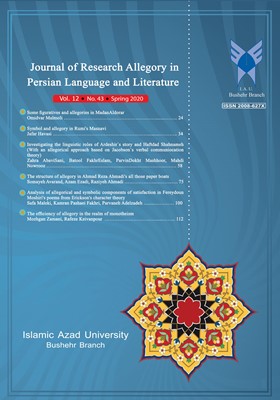Analysis of allegorical and symbolic components of satisfaction in Fereydoun Moshiri's poems from Erickson's character theory
Subject Areas : Research Allegory in Persian Language and Literaturesafa maleki 1 , Kamran Pashaei Fakhri 2 * , parvaneh Adelzadeh 3
1 - PhD student of Persian Language and Literature Department, Tabriz Branch, Islamic Azad University of Tabriz, Iran
2 - Associate Professor, Department of Persian Language and Literature, Tabriz Branch, Islamic Azad University of Tabriz, Iran
3 - Associate Professor, Department of Persian Language and Literature, Tabriz Branch, Islamic Azad University of Tabriz, Iran
Keywords:
Abstract :
Psychological analysis of literary works and the creators of these works is one of the new methods of critique and research in Persian literature. Accordingly, in this paper, the components of satisfaction in Fereydoun Moshiri's poems based on Erickson's personality development theory with a symbolic and allegorical approach are examined. This research, in addition to clarifying the forms of satisfaction in Moshiri's poetry, also reveals the extent to which he has succeeded in applying the arrays of symbolism and allegory. Attention to the origin of symbols and the type of allegories is another issue that has been considered in this article. According to Erickson's theory, inner satisfaction is formed in the shadow of fruitfulness and hope. The manifestations of these two components in Moshiri's poems are seen in the form of positive personality traits, such as a sense of responsibility, love, struggle against ignorance and violence, avoidance of regret and despair, etc., and more in the form of symbolic and allegorical forms. The symbols used in Moshiri's poems are often taken from nature, and allegories are mostly used to express intellectual and human concepts.
_||_

